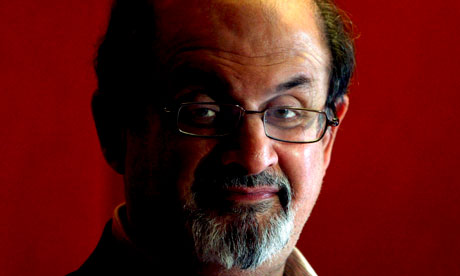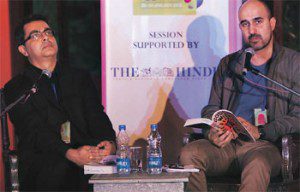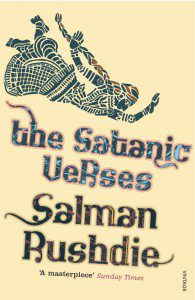The
board of trustees of English PEN today issue a statement of support in
solidarity with five writers who have faced harassment for defending
free expression in India.
Amitava Kumar, Hari Kunzru, Jeet Thayil, Ruchir Joshi and S. Anand, all attendees at the Jaipur Literary Festival, staged symbolic readings of The Satanic Verses after their fellow writer Salman Rushdie
was forced to cancel his planned appearance. Soon after, local police
arrived and began making enquiries about ‘illegal conduct’ at the
festival.
Salil Tripathi, English PEN Trustee and Chair of its Writers in Prison Committee, said:
These
events paint a worrying picture of the state of free expression in
India. The Rajasthan police offered no support to Salman Rushdie when
he was threatened. And instead of protecting authors who take a stand
defending free expression, the police appear to be harassing them
instead. The way the security services have handled this incident falls
way short of India’s aspirations and claims to be a democracy.
Gillian Slovo, President of English PEN, said:
The
Jaipur Literary Festival should be able to showcase a commitment to
artistic expression. Unfortunately, the threats against Rushdie, and the
subsequent harassment of those who stood up to defend him, demonstrate
how difficult it can be to do this in India.
The
organisers of the Jaipur Literary Festival issued a statement
distancing the organisers from the actions of the five authors, saying
that “any action by any delegate or anyone else involved with the
Festival that in any manner falls foul of the law will not be tolerated
and all necessary, consequential action will be taken”. Responding to
the statement, Gillian Slovo said:
The ban on The Satanic Verses
is an affront to free expression. It allows the kind of police
harassment we have seen this week in Jaipur, and legitimises the threats
of violence against authors like Salman Rushdie. It is disappointing
that the organisers of the festival did not use their position to
condemn this ban and so support a group of writers who did nothing more
than read from a work of literary fiction.
-------------------------------------o--------------------------------------------
Why I quoted from The Satanic Verses
I wanted to give a voice to Salman Rushdie, a writer silenced by a death threat, not offend anyone's religious sensibilities
-


Salman Rushdie, who decided not attend
the Jaipur Literature Festival in India after he had been told of new
death threats. Photograph: Alberto Estevez/EPA
On Friday, over lunch, I heard the news that Salman Rushdie would not be attending the Jaipur Literature Festival.
His visit had been in doubt for some time. Initially we had been
scheduled to have a conversation on stage that afternoon, but since Maulana Abul Qasim Nomani,
the head of the Darul Uloom seminary in Deoband, had called for him to
be prevented from entering India, the festival organisers had been
fighting a storm of manufactured controversy, not unconnected with the
upcoming Uttar Pradesh state elections.
Salman has been visiting
India without incident for many years, and spoke at the JLF in 2007.
Clearly, the sudden eruption of righteous indignation at his presence
was not spontaneous. The manipulation of religious sentiment for
political ends has a long history in India, and this was merely a
particularly cynical example of a traditional election-time activity.
Initially,
the directors of the JLF asked Salman to delay his arrival while they
worked with the authorities to provide security, and attempted to defuse
a planned protest. Our Friday event was moved to Tuesday morning, and
his name was removed from the festival programme. Then came the news,
apparently originating in police intelligence reports seen by the
festival team, that three assassins had been dispatched from Bombay with
orders to murder him. Now there appears to be doubt about the veracity
of these reports – Mumbai police deny that they communicated any such
intelligence, and the Hindu newspaper has reported that the story of the
assassins was concocted by the Rajasthani police. Whatever the truth of
this, it was enough to prevent Salman from travelling to India.
Amitava Kumar
and I were extremely angry. We felt that it was important to show
support for Salman, who is often misrepresented and caricatured as a
sort of folk-devil by people who know little or nothing about his work.
This situation has arisen in India at a time when free speech is under
attack. Recent moves to institute "pre-screening" of internet content,
and kneejerk bans of books such as Joseph Lelyveld's masterly biography of Gandhi, show that these are not good times for those who wish to say unpopular things in the world's largest democracy.
We
decided that we would use our afternoon session, in which Amitava was
due to interview me about my novel Gods Without Men to highlight the
situation. We decided (without consulting the festival organisers, or
anyone else) that I would make a statement, and then we would quote from
The Satanic Verses. We knew this little-read and much-burned book was
banned in India, but it was our understanding that this meant it was a
crime to publish, sell or possess a copy. We knew it would be considered
provocative to quote from it, but did not believe it was illegal. A
pirated text exists on the internet, and we downloaded two passages, 179
and 208 words in length respectively.
Our intention was not to
offend anyone's religious sensibilities, but to give a voice to a writer
who had been silenced by a death threat. Reading from another one of
his books would have been meaningless. The Satanic Verses was the cause
of the trouble, so The Satanic Verses it would have to be. We did not
choose passages that have been construed as blasphemous by Muslim
opponents of the book – this would have been pointless, as these
passages have overshadowed the rest of the content of the novel, which
concerns the relationship between faith and doubt, and contains much
that has nothing to do with religion whatsoever. We wanted to demystify
the book. It is, after all, just a book. Not a bomb. Not a knife or a
gun. Just a book.
To the audience in the Durbar Hall, I read the following statement. It is a little rough, as it was written in haste:
Today, I am sad to say, is a bleak day for Indian literature. We heard earlier from Gurcharan Das,
Alex Watson and Oscar Pujol about the place that doubt, dissent and
argumentation held in the very origins of Indian thought [this is a
reference to an earlier session, which dealt with scepticism in Vedic
philosophy]. Today, one of India's greatest novelists, Salman Rushdie – a
writer whose work enshrines doubt as a necessary and valuable ethical
position – has been prevented from addressing this festival by those
whose certainty leads them to believe that they have the right to kill
anyone who opposes them. This kind of blind, violent certainty is in
opposition to everything the festival stands for – openness,
intellectual growth and the free exchange of ideas. There are many
rights for which we should fight, but the right to protection from
offence is not one of them. Freedom of speech is a foundational freedom,
on which all others depend. Freedom of speech means the freedom to say
unpopular, even shocking things. Without it, writers can have little
impact on the culture. Unless we come out strongly in support of
Rushdie's right to be here, and to speak to us, we might as well shut
the doors of this hall and go home.
Then I read from the novel. I had already finished when Sanjoy Roy
came to the side of the stage and told us that we shouldn't continue.
Amitava and I spoke for some time about the influence of Rushdie on my
work, and of the themes of doubt and certainty in Gods Without Men. He
then quoted the second excerpt, a description of what London might be
like if it was "tropicalised", one of many comic passages in The Satanic
Verses which have no religious content. I would link here to the
passages we read, which I maintain are absolutely inoffensive to even
the most delicate religious sensibility, but given my current legal
circumstances, this does not seem wise.
At the end of the session,
I signed books. Quickly a mob scene developed as I was surrounded by
journalists who wanted to know why Amitava and I had made our protest.
Backstage, the festival organisers were upset. This was something about
which they had no foreknowledge, and over which they had no control. The
bad atmosphere was compounded by the news that, completely
independently, two other writers – Jeet Thayil and Ruchir Joshi
– had also read from The Satanic Verses. I was not present at that
reading, and I'll leave it to them to give an account of their actions
and intentions.
News of the readings travelled fast. Sanjoy Roy
was soon taking calls from clerics and politicians, including one from
the chief minister of Rajasthan. The Jaipur police commissioner arrived,
interviewed us briefly, and went away, apparently reassured that no law
had in fact been broken.
A lawyer appeared who closeted himself
with the festival organisers. He drafted a statement, which we were
asked to sign, making clear that the festival was not responsible for
our actions. It was left to my friend Sara Chamberlain to find someone
to provide legal advice to me. This advice was blunt: I should leave
India immediately, as otherwise I risked arrest and might well find
myself unable to return home to New York until any resulting cases had
been resolved.
The festival organisers later informed me that they
had been advised that it was unsafe for me to stay in Jaipur, and my
continued presence at the festival would only inflame an already
volatile situation. I left early on Saturday morning, and left India the
same day.
I would like to reiterate that in taking this action I
believed (and continue to believe) that I was not breaking the law, and
had no interest in causing gratuitous offense. I apologise unreservedly
to anyone who feels I have disrespected his or her faith.
I refute absolutely the accusation of Asaduddin Owaisi,
the Hyderabad MP who has accused me of "Islam-bashing under the guise
of liberalism". I stand on my public record as a defender of the human
rights of Muslims, notably my work for Moazzam Begg and other British Muslims detained without trial in Guantánamo Bay.
To
Mr Owaisi, and others who feel that the notion of "freedom of speech"
is just a tool of secular western interests, a license to insult them, I
say that the contrary is true. Freedom of speech is the sole guarantee
of their right to be heard in our complex and plural global culture. It
is the only way of asserting our common life across borders of race,
class and religion. Just as I reach out my hand to Salman Rushdie, I do
so to Mr Owaisi, and to Maulana Abul Qasim Nomani, whose seminary is,
after all, called the "House of Knowledge", in the hope that, as fellow
believers in the vital importance of words, we can resolve our
differences – or at least come to understand them correctly – through
speech and writing, instead of violence and intimidation.
• Comments on this article will be switched off overnight and turned on again at 9am Monday (23 January, UK time)
Source : The Guardian
------------------------------o-------------------------------------------
23 Jan 2012
 As
the controversy surrounding Salman Rushdie’s withdrawal from the Jaipur
Literary Festival rumbles on, Indian writers are organising against
censorship As
the controversy surrounding Salman Rushdie’s withdrawal from the Jaipur
Literary Festival rumbles on, Indian writers are organising against
censorship
Liverpool had its Fab Four, but now
Jaipur in India has its own Fab Five — writers Amitava Kumar, Hari
Kunzru, Jeet Thayil, Ruchir Joshi and Anand.
When the Rajasthan police apparently concocted a fictitious assassination plot leading Salman Rushdie to stay away from the Jaipur Literature Festival, the mood in Jaipur was glum. Everyone took the plot to be real, until The Hindu reported the convoluted manipulation by the police.
Many in India wanted to hear Rushdie, who avoided India during the
fatwa years and has been able to make only a few visits since 2000.
Festival goers were hoping to hear him speak about the filming of
Midnight’s Children and his forthcoming memoir. But protests from Muslim groups and the plausible threat made him change his mind.
Which is where the Fab Four came in. On Friday, Poughkeepsie,
NY-based Kumar, who teaches at Vassar and who has irritated Hindu
nationalists in the past with his magnificent, in-your-face memoir, Husband of a Fanatic started reading passages from The Satanic Verses. Hari Kunzru,
a British-Indian novelist based in New York also took a stand at the
same panel discussion. Both novelists stopped reading after the alarmed
festival organisers pleaded with them.
Kunzru, a former English PEN
vice-president, takes freedom of expression seriously. When the
European Writers’ Parliament met in Istanbul and Turkish authors
protested against the presence of VS Naipaul, forcing Naipaul to cancel
his appearance, Kunzru spoke out. Reading from Rushdie’s controversial
novel was no different.
The mood in Jaipur had changed. By Friday afternoon, unexpectedly, the poet and novelist Jeet Thayil picked another passage from The Satanic Verses, and read aloud. Finally, Ruchir Joshi, film-maker and novelist, whose magical The Last Jet-Engine Laugh is an uproarious account of a futuristic India, read from The Satanic Verses. Tensions rose.
Soon thereafter, the police arrived, making inquiries about illegal conduct
at the festival. Importing The Satanic Verses into India is prohibited
but the law is unclear if possessing the novel is a crime, or reading
aloud an extract from it is a crime. A lawyer or the People’s Union of
Civil Liberties, the only local civil society group to support Rushdie
last week, said that as the four authors read extracts from downloads,
and not a book, it may not be a crime. Shashi Tharoor,
novelist, diplomat, and parliamentarian pointed out he has routinely
quoted and cited from The Satanic Verses and never been troubled.
In any case, the police should not throw around terms terms such as
“guilt” and “crime”, as they have been doing, when they haven’t filed
charges, nor proved their case before a judge.

The government could claim that by reading from the novel the
authors incited the public. But incited to do what? Demand overturning
the ban, nothing more. In fact, eyewitnesses say that the four authors
were listened to in respectful silence, and warmly applauded. In any
case, if the government wishes to proceed against the authors and is
really mean-spirited, it could do so under S. 295A which gives the state
the power to use criminal law against individuals who may have intended
to cause trouble. But was there criminal intent, or mens rea? Sure,
this is defiance, and it challenges a governmental act but it is
Gandhian in its peaceful nature.
Police are seeking recordings of the reading, which, at the time of writing, the festival organisers are refusing to hand over. It is clear that the Rajasthan Police’s actions are meant to intimidate the authors and their supporters.
The role of the festival organisers — while their position is
delicate — also requires scrutiny. If an author read from Ma Jian’s
Beijing Coma, or Liu Xiaobo’s poems, or displayed Ai Wei Wei’s art at a
public event in China, one would expect that the police would swoop
down, and the organisers would very likely be forced to hand over the
author to the Chinese security.
But this is India; a nation that holds elections, calls itself a
democracy, and has a constitution that offers some protection for free
speech. The actions of the Indian government in recent days, the
intimidation of the five writers and its pusillanimity over Rushdie’s
visit fall considerably short of India’s aspirations and claims.
While the organisers haven’t yet handed over the tapes, they told the authors to leave Jaipur
immediately, lest they be arrested. It is not known if they offered
them any protection. Worse, a lawyerly statement was issued, which in
effect blamed the authors for “disturbing the peace”, because they acted
outside the confines of the law. The organisers dissociated themselves
from the action — which they can make a case for, but did not uphold
the four’s right to speak freely, which is harder to justify. They
should have said that even though they disagreed with the action, they’d
defend the principle of free speech. But India isn’t there yet, it
seems.
Future participants, apparently, will have to conform to rules not
yet defined, so that they act within the confines of the law. Such rules
defeat the rationale of a festival of literature, where ideas are
expressed to be argued over and debated; such rules restrict fundamental
freedoms.
On Sunday, the writer Anand —who publishes dalit literature under
the imprint Navayana — joined the protests, reading an eloquent passage
from The Satanic Verses, which underscores the spirit of the protests:
What kind of idea are you? Are you the kind that
compromises, does deals, accommodates itself to society, aims to find a
niche, to survive: or are you the cussed, bloody-minded, ramrod-backed
type of damnfool notion that would rather break than sway with the
breeze? The kind that will almost certainly, ninety-nine times out of
hundred, be smashed to bits: but, the hundredth time, will change the
world.
On Monday, leading Indian writers began to circulate a petition to the Indian Prime Minister, Manmohan Singh, calling for the ban on The Satanic Verses to be lifted. The battle to undo the damage of the past quarter century has begun.
There are no ifs and buts. As Rushdie wrote in The Satanic Verses:
A Poets work (is) to name the unnamable, to point at
frauds, to take sides, start arguments, shape the world and stop it from
going to sleep.
It is time for India to wake up.
Source : Index censorship
|
|
|

No comments:
Post a Comment